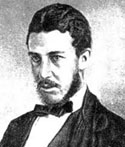William Stanley Jevons first theorized that efficiency could lead to using even more energy.
The Yale Forum on Climate Change and the Media

A bit of a buzz is making its way through media circles in response to some recent thought-provoking articles on the old principle called the Jevons Paradox, which says that as machines become more efficient and use less energy, society responds by growing and using even more energy.
William Stanley Jevons came up with the theory in the 1860s in Britain, looking at how efficient technology resulted in higher consumption of fuel. Modern terms for this idea include “rebound,” which refers to any increases in energy use that diminish the benefits of using those more efficient machines, and “backfire,” meaning the increases go beyond 100 percent of previous use.
Two recent articles in the mainstream press seem to conclude that because of these theories, making energy-efficient appliances and equipment is a losing proposition. The press should avoid rushing to that conclusion, however, because it ignores several other avenues of research going on into how people use energy.
In the first of the recent features, David Owen argues that as appliances, cars, and industry use less energy, people’s behavior will inevitably go toward finding ways to use even more energy. His feature story was published as ”The Efficiency Dilemma” in December 20 and 27, 2010, double issue of The New Yorker.
Owen quotes economists who are studying this problem anew, finding that the Jevons Paradox rings true even though Jevons was talking about coal in the 19th century, while today we’re talking about coal but also about natural gas, petroleum, and nuclear power.
(Abstract available. Subscription required for full access.)
More recently, in The New York Times on March 8, columnist John Tierney gloomily concluded that civilization inevitably will find ways to use energy more efficiently, but still will not use less. He begins with descriptions of ineffective top-loading clothes washers designed to meet government appliance standards. He ends with a quotation from the general counsel of the free-market Competitive Enterprise Institute, Sam Kazman: “Efficiency mandates have become feel-good mantras that politicians invoke.”
How Humans Behave and Change … A Critical Element
The reality, however, is that efficiency is only part of any mantra a politician might invoke. There are other factors involved in addressing the world’s energy consumption problems, and one important one is how people behave, said Karen Ehrhardt-Martinez,
Ehrhardt-Martinez has been studying the importance of behavior for several years, first as a staffer for the American Council for an Energy Efficient Economy and now as senior research associate for the new Renewable and Sustainable Energy Institute at the University of Colorado. She co-edited a book for ACEEE called Rebound, Technology, and People, available free from the ACEEE site.
“When implemented in isolation, technological solutions are more likely to result in rebound of various forms,” she said in an e-mail to The Yale Forum, “but by establishing people-centered approaches to energy and climate and by instituting smart policies, much of the rebound effect can be mitigated.”
No Substitute for Decarbonizing Supplies
It’s important, of course, for the media to understand the rebound effect and what economists are now saying about it. Owen quotes a new report that reporters will find helpful: “Energy Emergence: Rebound and Backfire as Emergent Phenomena.”
That report, by Jenkins, Nordhaus and Shellenbeger, reviews economic studies going back to Jevons and concludes that for society to treat efficiency as an energy source, the energy has to cost something more than the fuel itself. “Below-cost improvements in energy efficiency are likely to trigger significant rebound in energy demand,” they write.
But they go on to say: “Fast growing economies that use energy ever more productively are capable of more rapidly decarbonizing the energy supply system, as they have greater resources to invest in advanced energy technology that is both highly efficient and less carbon intensive. Such economies also value ecological amenities highly and are more willing and able to spend more money for cleaner energy. Ultimately, the primary implication of this survey is that there is no substitute for the difficult work of decarbonizing the global energy supply.”
This point is considerably more upbeat on energy conservation initiatives than either the Owen or Tierney articles. How society will reduce its ever-rising energy consumption in the face of finite supplies and increasingly demanding challenges in accessing, securing, and using fossil fuels poses both challenges and opportunities not only for society but also for media tracking that effort. Questions involving the Jevons Paradox and rebound are one element of that story.
Civilization eventually will be forced into switching to alternative fuels, and things in the end will come down to money. When energy becomes more expensive, people will use less of it.
‘Do’s and Don’ts’ for Reporting on Energy Efficiency
With all this in mind, here are some “do’s and don’ts” for the media on addressing the important but complicated world of social scientists who study energy conservation and efficiency:
1. DO quote economists as Tierney and Owen do. Environmental reporters fully appreciate how important economic theory is to energy use.
2. But DON’T forget other vital branches of the social sciences, particularly psychology, but also history and sociology. Many dozens of researchers in the United States, Britain, and elsewhere are studying how subconscious attitudes, peer pressure, status, and politics can affect the amounts of energy we use.
3. DO cover all of the serious R and D in building efficiency (power systems, fuel cells, etc), boosted, for instance, by U.S. Energy Secretary Stephen Chu. Chu has been traveling the country issuing challenges to companies to make buildings run on much less energy. It is these unseen systems that gobble up much of the energy.
4 But, taking a cue from Owen and Tierney, DON’T assume that building efficiency on its own will make as huge a difference as proponents say. Like them, be skeptical of how quickly it can. Ask, ask, ask, about what fossil fuels are required for building-size fuel cells, new turbines, and more.
5. DO pay attention to social science research addressing how people conserve energy by changing their behavior — this is quite different from energy-efficient technology. This is about people’s daily decisions. Because domestic energy demands and cars contribute so much of the available energy resource, social scientists call the potential of individual behavioral changes to effect change “the behavioral wedge.”
6. DON’T rely on activists’ or government’s “living simple” lists and campaigns as principal sources for stories on saving energy, inspiring though they may be. Ask what impact certain changes can have, and ask for studies that prove it. Remember: If it sounds too good to be true, it probably is just that.
About This Article
In winter 2011, I was doing a lot of reporting on social science research into how people behave as they use energy. Then two articles came out in prominent outlets that I was certain placed way too much importance on theories that conclude, basically, it’s little use to make our machines more efficient, because we humans will just be even more wasteful, anyway. I realized that the landscape of people using energy, and he urgency to use less energy per person into the future, is much more complicated than that. This article was posted on the Yale Forum on Climate Change and the Media on March 17, here.
